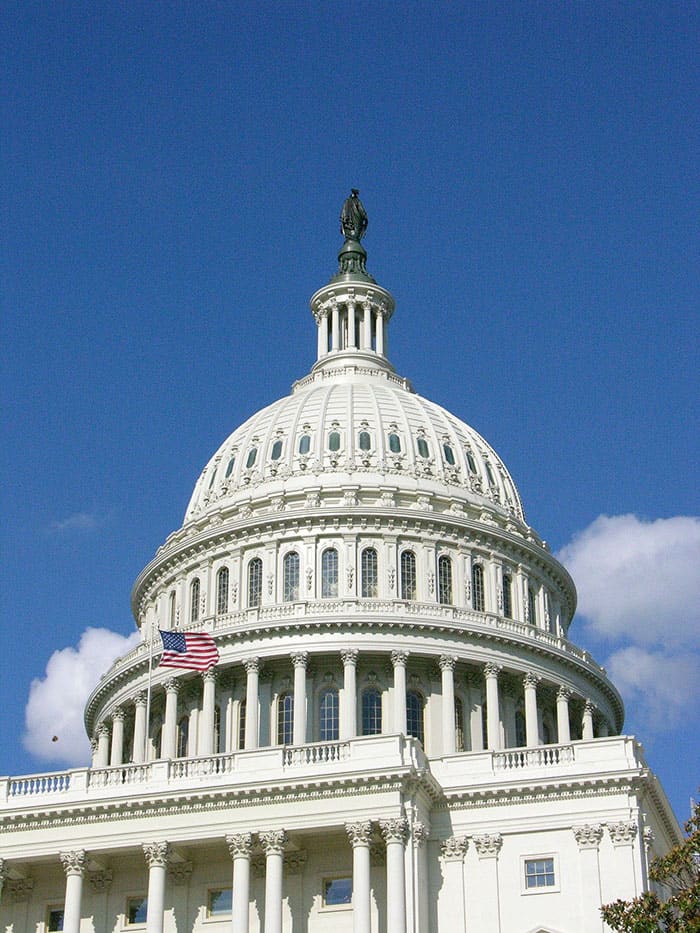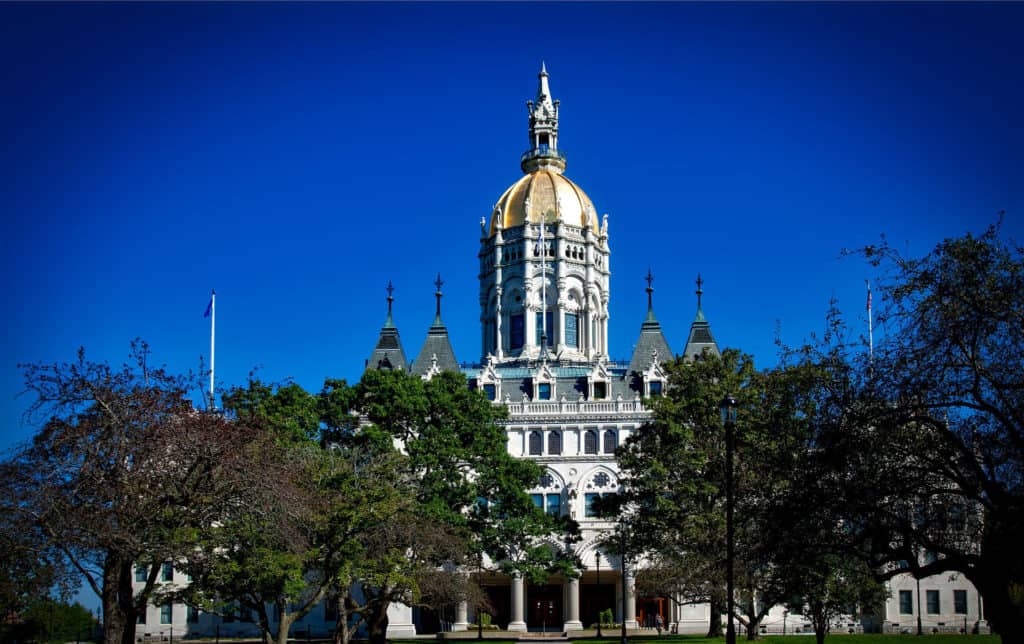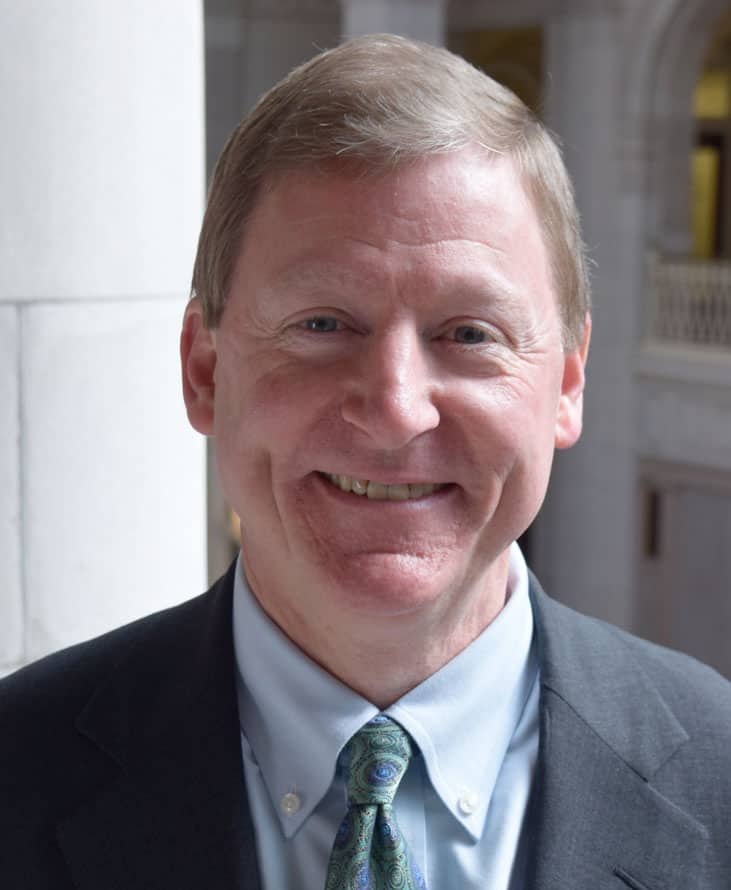Trinity Public Policy Courses Studying ‘Real-Life Civics Lesson’ of COVID-19 Response
Students in Trinity’s undergraduate Public Policy and Law and graduate Public Policy programs have a unique opportunity this semester to study what one professor calls a “real-life civics lesson,” as states and the federal government grapple with how to respond to the COVID-19 pandemic.

Adrienne Fulco, associate professor of legal and policy studies and director of the Public Policy and Law Program, says that she is supplementing the curriculum for her “Federalism and Public Policy” undergraduate course with current articles and online discussions connecting the day’s news with the topics covered in class.
“The purpose of the course,” Fulco says, “is to investigate the strengths and weaknesses of our system of federalism, where the states have authority over some things, the federal government has authority over others, and sometimes those come into conflict.” While the course normally covers topics like gun policy and marijuana policy, Fulco has created opportunities for students to consider the types of emergency health policies that are making headlines today.
 “Right now we’re seeing the difficulty of creating a coordinated federal health response in the U.S. The states have authority, but no state is prepared to deal with this huge and novel kind of medical emergency,” she says. “I’m trying to teach the students to think about, When is it beneficial to have the states oversee certain kinds of activities, when is it not, and are there any matters over which the federal government should have more power than the states?”
“Right now we’re seeing the difficulty of creating a coordinated federal health response in the U.S. The states have authority, but no state is prepared to deal with this huge and novel kind of medical emergency,” she says. “I’m trying to teach the students to think about, When is it beneficial to have the states oversee certain kinds of activities, when is it not, and are there any matters over which the federal government should have more power than the states?”
For some students, the pandemic response helps to clearly illustrate the ideas introduced in the course. Ailani Cruceta ’22 says, “Being able to connect the current events of the pandemic to the topic of federalism has furthered my understanding of the concept. I also have developed a genuine interest in the topic and how it plays out in other policy areas outside of the ones discussed within the classroom. This class really pushed me to think about the laws and rights that exist within a federal and state level. The concept of what rights the government should have in moments like this one is a concept that had never crossed my mind until this pandemic.”
Olivia Weckwerth ’21 adds, “This class has helped me notice the fact that every state has different procedures they are taking in regards to this pandemic. This creates an issue because when there is a multi-state approach and people can travel from one state to the other, there is no way to truly stop the transmission of the virus due to each state acting on its own.”
 Dayna Vadala ’21, Fulco’s teaching assistant for the class, helps put together a weekly newsletter that keeps the class up to date on the latest federalism-related news about COVID-19. “We have set up an optional discussion forum for students to communicate about these issues,” Vadala says. “This pandemic has truly exemplified how the state and federal governments work together and which level of government is responsible for each decision. It’s a real-life example of everything we have been studying.”
Dayna Vadala ’21, Fulco’s teaching assistant for the class, helps put together a weekly newsletter that keeps the class up to date on the latest federalism-related news about COVID-19. “We have set up an optional discussion forum for students to communicate about these issues,” Vadala says. “This pandemic has truly exemplified how the state and federal governments work together and which level of government is responsible for each decision. It’s a real-life example of everything we have been studying.”
Fulco adds, “I’m hearing from several students that they’re glad to have the class to help them think through what’s going on. They have been applying their knowledge in a way that makes me proud. My goal is to make them well-informed; it gives them a sense that they understand what’s going on, even though they can’t control it or fix it.”

Sean Fitzpatrick, a professor of the practice in public policy who teaches in Trinity’s Graduate Studies program, says that his “Leadership in the Policy Arena” course always incorporates current issues and policy challenges, so it was natural to add the pandemic response to this semester’s curriculum. “This is too perfect a case study, because it involves government at all levels,” Fitzpatrick says. “This is one of those situations where you wish you didn’t have such a great example to study, but here it is.”
The course examines different leadership theories and approaches, some of which have come into conflict with each other during the pandemic. “What I teach students is to read the news; you will find the things that we are talking about in class every day,” Fitzpatrick says. “We’re getting a real-life civics lesson right now about the way the government functions at all levels. This pandemic will impact the decisions we make going forward about what priorities get funded and how federal, state, and local governments should interact with each other. I suspect we’ll be talking about this for years to come in my classes.”
Fitzpatrick says he is encouraged by how active and thoughtful students in the class have been during this crisis. “The students are rising to this occasion. I think it’s giving them a way to think proactively while we’re all feeling some anxiety and helplessness,” he says. “Academically, our students will remember this semester.”
